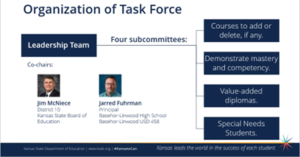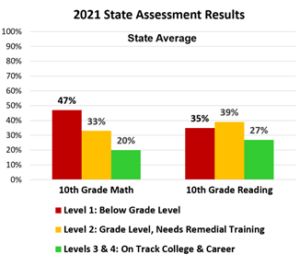Graduation task force ignores the low-achievement elephant in the room
(The Sentinel) – Faced with an enormous student achievement problem, the Kansas State Board of Education is taking the very predictable bureaucratic approach of creating a graduation requirements…

(The Sentinel) – Faced with an enormous student achievement problem, the Kansas State Board of Education is taking the very predictable bureaucratic approach of creating a graduation requirements task force. Its role has nothing to do with the problem, naturally, because the education bureaucracy wants to cover up the problem instead of addressing it.
The task force is replete with all the usual trappings; a leadership team, four sub-committees, and lots of pretty graphics.

And naturally, every graphic contains a deceptive piece of propaganda – “Kansas leads the world in the success of each student.” That is officially their ‘vision,’ but it most often appears as a statement of fact.
With only 21% of Kansas graduates who took last year’s ACT considered college-ready in English, Reading, Math, and Science, Kansas doesn’t come close to leading the nation, let alone the world.
Board member Jim McNiece recently spoke to the Wichita Chamber of Commerce’s Government Relations Committee about the task force, and he was peppered with questions about the real issue of low student achievement.
Some GRC members noted that many high school graduates are academically unprepared for college or the workforce and asked what is being done about the problem. They say McNiece carefully tip-toed around the question without really providing an answer. And that’s not surprising because the State School Board and the Department of Education do not have an answer when asked how many years it will take to at least get all students to grade level.
But they will have to give an answer soon, thanks to legislation just passed. School board members must now conduct a needs assessment of every school to identify barriers to better outcomes. Then they must determine the budgetary changes needed to overcome them and estimate the number of years it will take to get all students to grade level.
 About a third of Kansas students are below grade level in reading and math, which gets worse as students approach graduation. The 2021 state assessment results show there are more high school students below grade level than are proficient and on track for college and career.
About a third of Kansas students are below grade level in reading and math, which gets worse as students approach graduation. The 2021 state assessment results show there are more high school students below grade level than are proficient and on track for college and career.
Almost half are below grade level in Math, and only 20% are proficient. Results for English Language Arts are nearly as bad; a third are below grade level, and only a quarter is proficient.
These wholly unacceptable outcomes cannot be blamed on COVID. More high school students were below grade level than proficient before the pandemic.
Diplomas are merely attendance awards for many students
Last year, the Kansas Department of Education gave out 65 Gold Awards and 26 Silver Awards to districts with high school graduation rates at or above 93%. But how many school districts do you think received Gold or Silver Awards for Academic Preparedness? Just one – USD 207 Fort Leavenworth.
As the late great Walter Williams said, “It’s grossly dishonest for the education establishment and politicians to boast about unprecedented graduation rates when the high school diplomas, for the most part, do not represent academic achievement. At best, they certify attendance.”
School officials know this to be true. At a meeting of the Public Policy & Advocacy Committee of the Overland Park Chamber of Commerce in 2019, I said schools in Johnson County and elsewhere give diplomas to students who are below grade level. Several committee members expressed strong disagreement, and one of them stormed out of the room. But the two school superintendents in attendance – Olathe Superintendent John Allison and Shawnee Mission Superintendent Michael Fulton – said nothing.
School officials perpetuate educational discrimination
Poor student achievement, especially for students of color and those from low-income families, is the civil rights and social justice issue of our times. Yet education officials repeatedly demonstrate that they won’t do anything about it.
They ignore state law requiring annual building needs assessments intended to identify and remove barriers to improvement. Legislators provide over $400 million annually to help at-risk students, but a 2019 state audit determined that most of the at-risk spending they examined “was used for teachers and programs for all students and did not appear to specifically address at-risk students as required by state law.”
The graduation requirements task force further proves that Kansas education officials will not deal with the state’s serious student achievement problem. The Legislature must intervene with universal educational choice to give kids a fighting chance to be successful in life.



